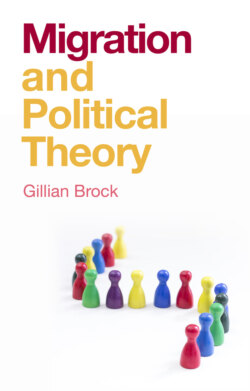Migration and Political Theory

Реклама. ООО «ЛитРес», ИНН: 7719571260.
Оглавление
Gillian Brock. Migration and Political Theory
Contents
Guide
Pages
And Political Theory series
Migration and Political Theory
Acknowledgments
1Introduction
1.1 Some facts about migration today
1.2 International migration: some types, drivers and effects
1.2.1 Key terms
1.2.2 Important drivers of migration
1.2.3 Some central general economic impacts
1.3 Is the contemporary state of affairs unique? Some history
1.4 Overview of subsequent chapters
2The Right to Exclude and Open Borders
2.1 Arguments for states’ rights to exclude
2.1.1 Walzer, self-determination and protecting the character of communities
2.1.2 Freedom of association
2.1.3 Ownership of institutions
2.1.4 Arguments for closed borders in virtue of the costs of open borders
2.2 Arguments for obligations to allow free movement across borders. 2.2.1 Joseph Carens: feudalism, convergence, and freedom
2.2.2 Freedom (again)
2.2.3 Concerns of global justice and inequality
2.2.4 The utilitarian case for open borders
2.2.5 Co-ownership of earth’s natural resources
2.2.6 Taking history seriously
2.3 Conclusions
3Forced Migration and Responsibilities: The Case of Refugees
3.1 Who counts as a refugee?
3.2 Current arrangements for assisting refugees
3.2.1 Asylum
3.2.2 Resettlement
3.3 Duties to refugees. 3.3.1 Common arguments for duties to assist refugees
3.3.2 What do we owe refugees? What is the content of our duties?
3.3.3 Repatriation and its limits
3.3.4 Resettlement as a strict duty
3.3.5 Are there limits on our obligations to refugees?
3.4 Some contemporary issues concerning duties to refugees. 3.4.1 Camps and temporary measures
3.4.2 Debates about how to assist refugees effectively: linking refugee assistance with issues in development and conflict studies
3.4.3 Environmental displacement and climate change refugees
3.5 Conclusions
4Which Criteria May States Permissibly Use in Selection and Citizenship Policies?
4.1 Which criteria may states use in their admissions policies?
4.1.1 Obligatory admissions
4.1.2 Discretionary admissions
4.2 Some critical discussion of Carens’s influential account
4.3 Which criteria may permissibly be used in granting citizenship?
4.3.1Young immigrants
4.3.2Adult immigrants
4.4 Should citizenship be for sale?
4.5 Conclusions
5Legal Immigrants and their Host States: Rights and Responsibilities
5.1 Multicultural citizenship: Will Kymlicka and his critics. 5.1.1 Will Kymlicka on multicultural citizenship
5.1.2 Some prominent critics and criticisms
5.2 Beyond legal citizenship to inclusion
5.2.1 Rules
5.2.2 Informal norms
5.2.3 Incentives
5.2.4 Practices of recognition
5.2.5 National identity
5.3 David Miller on integration
5.4 Conclusions
6Undocumented Migrants and Their Host States: Rights and Responsibilities
6.1 Do undocumented migrants have any rights? Some basic human rights considered
6.1.1 Basic human rights
6.1.2 Children’s rights
6.1.3 Work-related rights
6.1.4 Social and administrative rights
6.1.5 The need for a firewall
6.2 Rights to remain: considerations in favor of regularization
6.2.1 Humanitarian concerns
6.2.2 Contribution or causal connections
6.2.3 The legitimacy of the state system
6.2.4 Social membership
6.2.5 Schemes of social cooperation and fair reciprocity
6.2.6 Proportionality and the statute of limitations
6.3 Criticisms of regularization
6.3.1 Earning the right to become a citizen
6.4 Conclusions
7Fair Treatment for Temporary Migrant Workers
7.1 Walzer’s influential argument on guest workers and justice
7.2 Can any temporary migrant worker program ever be justified? 7.2.1 Such programs are never justified
7.2.2 Migrant worker programs are sometimes justified
7.3 Conclusions
8Justice in Out-Migration
8.1 The Siracusa Principles
8.2 The brain drain: why is there a problem? 8.2.1 What is brain drain?
8.2.2 Why is there a pressing normative issue? Some background, illustrated using the case of health care
8.2.3 What important consequences result from healthcare worker migration?
8.3 Addressing issues of brain drain: responsibilities and policy options. 8.3.1 High-income country responsibilities
8.3.2 Low-income country responsibilities
8.3.3 Departing citizens’ responsibilities
8.4 Can the case of migrating healthcare professionals generalize to other sectors?
8.5 Conclusions
9Emerging Issues and Future Directions
9.1 Contemporary issues concerning enforcement
9.1.1 Inherent wrongs
9.1.2 Proportionality
9.1.3 Necessity
9.1.4 Enforcement and burdens on minority groups in the host society
9.2 Resistance
9.2.1 Citizens and resistance
9.2.2 Migrants and resistance
9.2.3 People smugglers
9.3 Cities and immigration
9.4 Methodological challenges to contemporary approaches
9.5 How might considering the Covid-19 situation change debates about migration in the future?
9.6 Concluding reflections
Bibliography
POLITY END USER LICENSE AGREEMENT
Отрывок из книги
Mary Hawkesworth, Gender and Political Theory
Brian Orend, War and Political Theory
.....
Here I pick out only a few examples to give a flavor of some of the large-scale migrations that have taken place. Often migration has been driven by tensions and has in turn been the source of further tensions. Migration can also be a way to connect diverse communities across the world and to promote mutually beneficial goals. I have chosen a few instances to illustrate how there have been several common reasons for movement across the centuries. Dominant among these reasons are two: first, attempting to escape conflict, persecution, or violence; and, second, seeking better economic, social, or political opportunities for oneself and one’s family.
During the world wars and their aftermath, there was considerable movement, with millions motivated to avoid genocide, conflict, and hostilities. The Potsdam Agreement, signed in 1945, gave rise to the largest migration in the twentieth century in which approximately 20 million people were resettled; 16.5 million Germans were expelled from Eastern Europe, but so were hundreds of thousands of Poles, Ukrainians, Lithuanians, and Belarusians. Many Jews from Eastern Europe also migrated to countries such as Israel and the United States.
.....